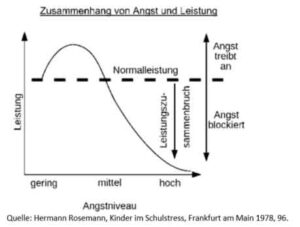Before an exam, worries and anxieties can become a burden. They become a problem when they lead to procrastination, avoidance behaviour or even mental blocks during the exam. The Center for Teaching and Learning (CTL) has compiled tips to help you deal with exam anxiety.
Exam = exceptional situation
An exam is an assessment situation that has consequences: In case of success, planned steps become possible. In case of failure, they become impossible or at least more difficult. In addition to the different meanings of the exam, the exam situation itself is challenging: You are expected to achieve a certain examination result at a specific time and within a limited period of time.
In addition – and we are usually not aware of this – not only subject-specific knowledge is necessary for an exam: You are expected to have knowledge of the exam (procedure and examination types), cognitive competences such as in organising your way of studying, comprehending the examination questions or planning the exam procedure and, eventually, mental abilities such as the ability to cope with the excitement or the time pressure or accepting the competitive situation. All of this together can definitely lead to exam anxiety – but how does it affect you?
What are the effects of exam anxiety?
A certain amount of excitement before and during an exam usually has an activating effect. However, intense exam anxiety can lead to a decrease in performance (see illustration): In some cases, students might find it difficult to study or rather avoid it and they may experience lapses or even mental blocks during the exam.
Feelings of anxiety lead to an automatic reaction of the nervous system, which may cause unpleasant reactions such as increased blood pressure, sweating, nausea and even mental blocks. The bad news is: You cannot control this reaction. The good news is: Every person can influence the level of anxiety. The key point here is the personal evaluation of the exam situation.
How to cope with exam anxiety?
Tip 1: Change the thoughts of anxiety
Past experiences, especially negative ones, play a role that you should not underestimate in the evaluation of the upcoming exam. The upcoming exam is viewed through the glasses of past experiences, so to speak. Changing these thoughts is easier said than done. But: This is a very important step!
- Try to differ between the past and the present and become aware of your current prerequisites and strengths.
- Remember positive exam experiences – and you have surely made some positive ones, otherwise you would not be where you are now! Your positive memories show you that exams can work out well.
Tip 2: Reduce the exam anxiety
Exam anxiety can feel overwhelming and at the same time diffuse. To understand the anxiety, it can be helpful to face it despite the unpleasant feelings and to find out what exactly causes anxieties and insecurities. Based on this, you can then consider what might help you to overcome them. Do your anxieties revolve around …
- … the content of the exam? Could an exchange with fellow students be helpful? Can you find someone to explain to you the content areas that you find difficult to understand? Or can you – when looking at the subject from a distance – find future scopes of application, in which the learned content could be important?
- … the exam situation in general? It might be helpful to keep in mind the goal you can achieve with this exam. Or maybe it is good for you to visualise the exam. It can also be helpful to create an atmosphere of familiarity: Take a person of trust to your oral exam or ask them to be there after your written exam. And: Reward yourself after the exam!
- … the examiner? Certain examiners can be frightening, which is especially relevant in case of oral exams. Be prepared to stay calm and consider things from a distance during your preparation. The following tips for oral exams may also be helpful:
- … the type of exam (e.g. written exam, multiple-choice exam, oral exam, written paper or thesis)? It is helpful to consider how to best prepare for the relevant type of exam and how you will answer the questions during the exam. The following blog posts provide tips on the following topics:
- … the weight/importance of the exam? Before you feel overwhelmed by the importance of the exam, it is helpful to consider what would happen in the case of a negative exam result. Note down the different points and consider possible opportunities for actions.
Tip 3: Do not let unpleasant emotions become overpowering
Academic studies have shown that it is usually not exam anxiety that affects the exam result. Rather, the fear of the anxiety makes the anxiety seem even bigger and more influential. Therefore, it is important to accept the emotions, but to not allow them to take up too much space.
- It is helpful to be aware of the exam anxiety and, at the same time, to reassure yourself that the anxiety will come but that it will also go away. You can imagine examination anxiety like a wave.
- If you suffer from an intense form of exam anxiety, it is good to get support. For example, the Psychological Counselling Services is a good and specialised counselling office for this.
Tip 4: Take good care of yourself
Exams mean stress on many levels. Therefore, it is very important to take a good care of yourself and to calm your stretched nerves as good as possible. For example, take a walk in the woods, have a quiet cup of tea, go for a run or just stare holes in the air.
Tip 5: Effective exam preparation
And last but not least, effective preparation is a good way to counter exam anxiety. Exam anxiety is closely connected to the (subjectively) perceived control over the situation. Everything that makes the exam situation more predictable can be helpful:
- Familiarise yourself with the examination requirements on u:find
- What did the exam look like in the past? You can find information about the course in the forums on the Internet. Sometimes also the teachers provide exam questions from previous years.
- You can use these exam questions as a basis for a mock exam. Or you can form a study group with colleagues and simulate an exam with questions you come up with yourself including time limits. Correcting the exam together will help you understand the material even better.
- The following topics may also be relevant for you when preparing for an exam:
- Learning strategies
- Organising working time efficiently
- Avoiding planning errors and procrastination
In this spirit: We wish you all the best for the upcoming exams. ✊




